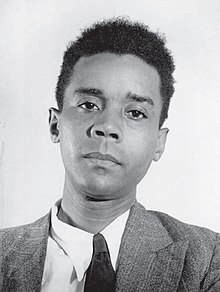
C.L.R. James, the West Indian writer and political activist, lived at 165 Railton Road during the last years of his life. He lived above the offices of the collective ‘Race Today’ led by C.L.R. James’s nephew, Darcus Howe. Howe came to public attention in 1970 as one of the ‘Mangrove Nine’, arrested and tried on charges that included conspiracy to incite a riot, following a protest against repeated police raids on ‘The Mangrove’ restaurant in Notting Hill.
Howe subsequently became a TV broadcaster and chairman of the Notting Hill Carnival.
Despite CLR James’s extensive political activities and his life long fight to develop the theories and practices of Leninism, he is perhaps best known, particularly by cricket fans, as the author of ‘Beyond a Boundary’. James himself described the book as “neither cricket reminiscences nor autobiography” but it is often named as the best single book on cricket ever written (or even the best book on any sport).
John Major, in his history of cricket, ’More than a Game’, wrote that C.L.R. James claimed cricket had a magic that was a guiding light for the dispossessed and the disenfranchised. He believed cricket touches deep and conflicting emotions and offers added value to society. Interestingly John Major himself also lived in Brixton, in the top flat at 144 Coldharbour Lane, and in his book he reminisces about playing cricket in the street using a lamp-post as the wicket.
